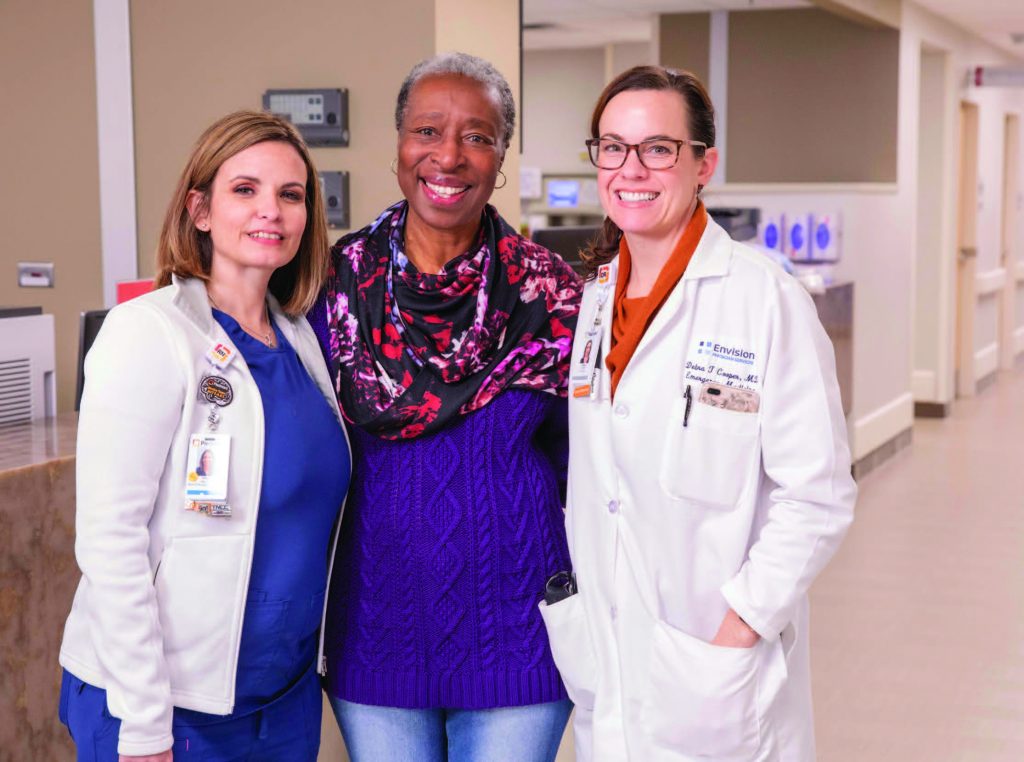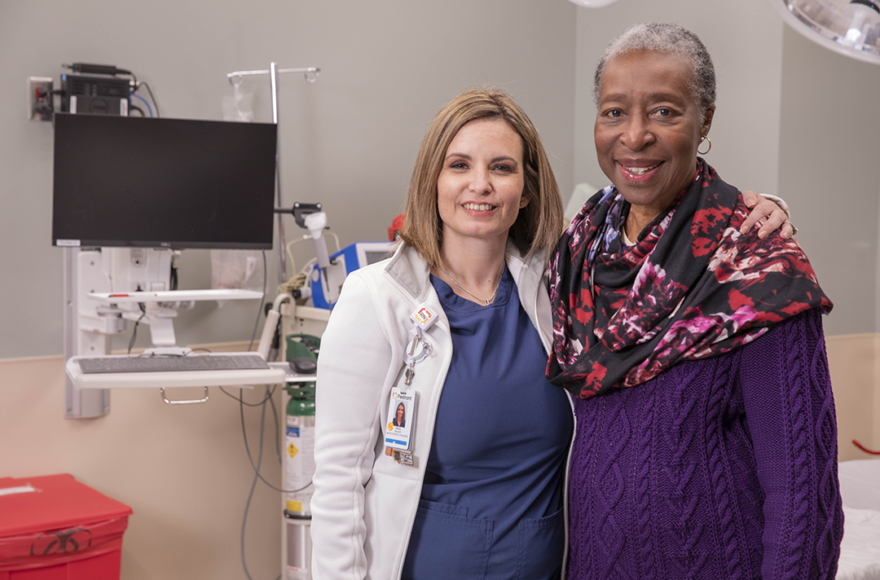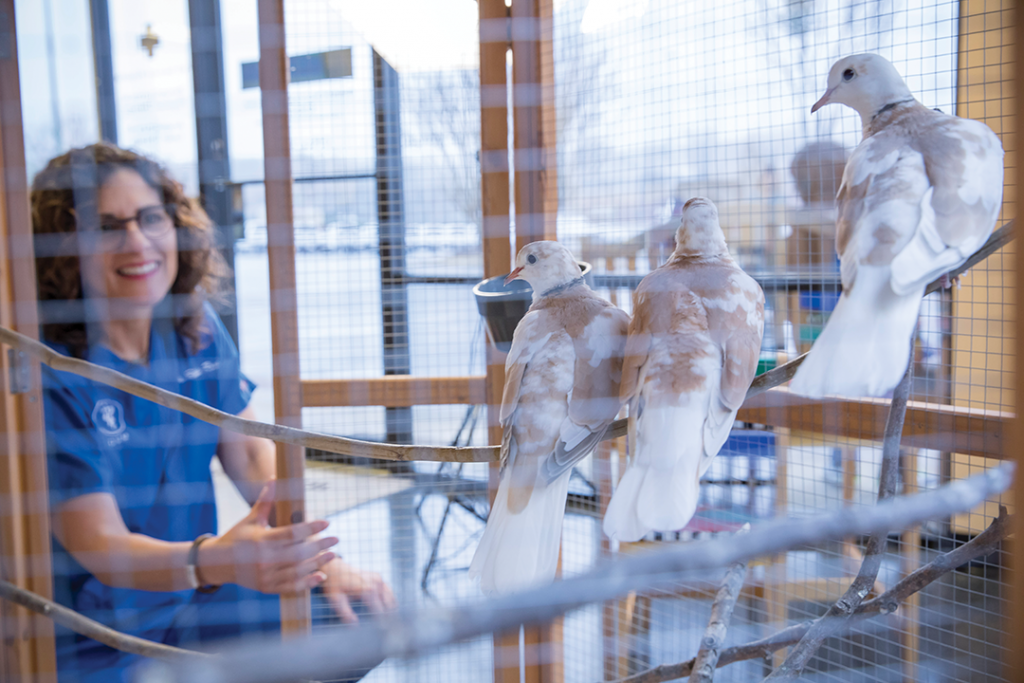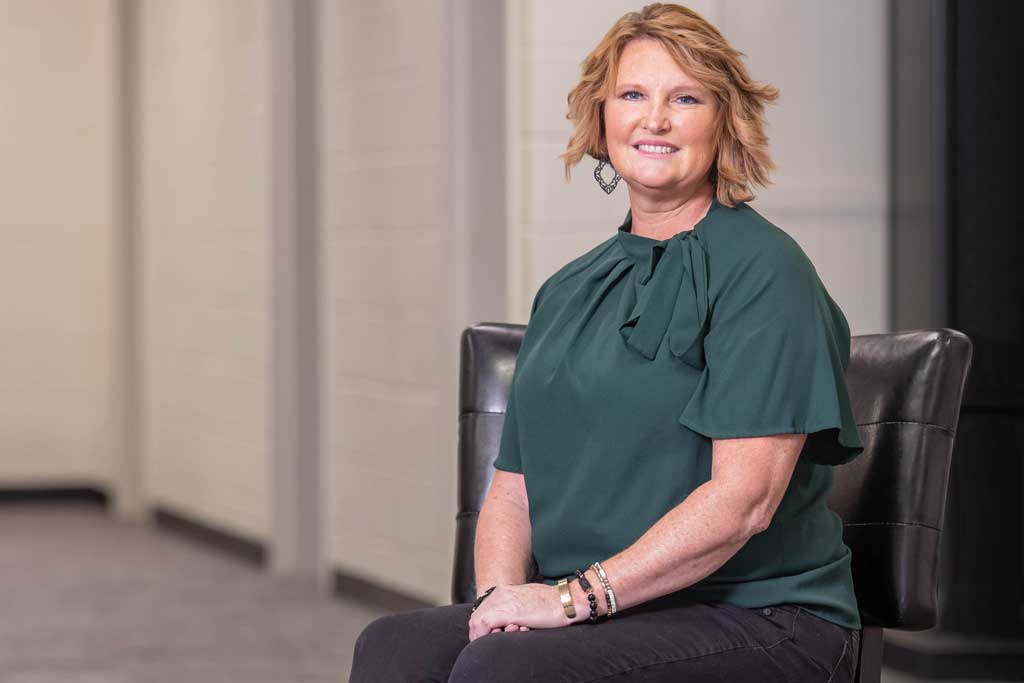After suffering multiple strokes and the associated effects across the last two decades, Barbara Douglas stands as a testament to unshakable faith, vital medical care and candid self-assessment.
Barbara Douglas was relaxing at home, reading her Bible and listening to music. “Trust me,” the chorus of the gospel song repeated, and the devout Christian meditated on her faith as she waited for her son to call. She knew he needed a ride to work that day. When the house phone rang, she was unable to answer it. She simply could not lift her arm to pick up the receiver. Douglas was terrified to find herself paralyzed from the neck down.
“I was not in pain,” the Covington resident said, “but I wasn’t able to move anything but my eyes.” Panicked, she began to pray: “Lord, if it is your will for me to live, please let me be able to dial 911.” Miraculously, she mustered the ability to press the buttons on her telephone and connect with emergency services. However, when the dispatcher answered, Douglas was unable to speak. “I couldn’t move or talk,” she said, “but my spirit was able to pray.” Naturally, Douglas prayed, and an ambulance arrived soon after. It was not long before she learned that she had suffered what would be the first of many strokes.

Stroke, which affects blood flow to and through the brain, is the fifth-leading cause of death in the United States and a leading cause of disability. A stroke happens when a clot forms and blocks a blood vessel, or when a weak blood vessel ruptures. This causes death of brain tissue from a lack of oxygen. The symptoms associated with stroke vary according to which part of the brain is affected. Since her first stroke in 1998 at the age of 51, Douglas has experienced several transient ischemic attacks, or TIAs, often called “mini-strokes.” In most cases, her first sign was being unable to move or speak—or both. Other common warning signs of stroke are included in the acronym BE FAST:
- Balance: Watch for sudden loss of balance.
- Eyes: Check for vision loss.
- Face drooping: Does one side of the face droop or is it numb? Ask the person to smile. Is the person’s smile uneven?
- Arm weakness: Is one arm weak or numb? Ask the person to raise both arms. Does one arm drift downward?
- Speech difficulty: Is speech slurred? Is the person unable to speak or difficult to understand? Ask the person to repeat a simple sentence, like “The sky is blue.” Is the sentence repeated correctly?
- Time to call 911: If someone shows any of these symptoms, even if the symptoms go away, call 911 and get the person to the hospital immediately. Check the time, so you will know when the first symptoms appeared.
“I’m not a good person to tell others how to avoid stroke, because we still don’t know what caused mine, but the most important thing is prayer. With God’s help, there is another side to life after stroke.”
Barbara Douglas
According to the American Stroke Association, 80 percent of strokes are preventable. However, a specific cause for Douglas’ repeated strokes was never found. She has a history of high blood pressure but has kept it in check through medication and a healthy lifestyle.
“I was already doing everything they told me to do to prevent a stroke, and I still do these things,” she said. “I exercise, I drink a lot of water, [and] I cook almost every meal at home. When you eat out a lot, you don’t know what’s in the food. Everything has some sodium, but restaurant food has a lot of it, so I prefer cooking and knowing what I’m eating.”
In June, Douglas and her husband, Ronald, had recently returned from a trip to Japan. She was relaxing at home after dinner when she began to feel that her blood pressure was rising.
“I can feel it when it goes high, and I can feel when it goes low,” she said. Alarmed at the high reading, she soon felt the all-too-familiar inability to move. Her husband called for an ambulance to Piedmont Newton Hospital. Erica Walker, a registered nurse who serves as the hospital’s stroke and cardiovascular coordinator, was working in the emergency room that day. She verified that Douglas was experiencing another stroke and administered life-saving tissue plasminogen activator.
“This was the first time that blood clots were involved,” Douglas said. “I’d never had clots before. They gave me the clot-busting drug, and within 30 minutes, I was able to speak again.” Just three months later, on her September birthday, Douglas suffered a stroke that presented differently from the others. “This time, I had been feeling an odd pulsing feeling on the right side of my head for a few weeks. I had told my doctor that something felt off, but they couldn’t find anything. When I woke up on my birthday, the pulsing sensation was stronger. It wasn’t exactly pain, but it was uncomfortable,” she said. She stumbled from dizziness when she tried to get out of bed and needed her husband’s help to walk the few steps to the bathroom. Unsure of what was happening, Ronald drove his wife to Piedmont Newton’s ER. Although she retained her ability to speak, it was clear she had suffered another TIA. She remained in the hospital for four days.
“I am a walking miracle,” Douglas said while weighing her medical history. “Nobody but Jesus. I am so thankful for the staff at Piedmont Newton. I have had great experiences with everyone there, from the nurses to the doctors to the nutritionists, but I give all the credit to God for giving them the knowledge to treat me.”
Now 73, the mother of three, grandmother of six and great-grandmother to two suffers some lasting effects from her strokes. However, she emphasizes that there is life after this kind of health crisis.
“I want people to know that they can come through it, by the grace of the good Lord,” Douglas said. “I can’t walk as far as I used to, but I can still walk. I recently started driving again. I limit myself to how far I drive, but I’m grateful to be able to drive.”
Housework and errands take longer than before, and she struggles with loud noises. Tasks that require a lot of concentration are mentally fatiguing, and Douglas must write down details to remember them. Occasionally, her speech will slur, and she is plagued by random issues with balance. However, she works hard to maintain an active lifestyle.
“I’m able to work part-time as a recordkeeper at Kumon tutoring center in Conyers,” Douglas said. “They’ve been flexible with me, and I enjoy continuing to work when I feel up to it. I’m not a good person to tell others how to avoid stroke, because we still don’t know what caused mine, but the most important thing is prayer. With God’s help, there is another side to life after stroke.”
Click here to read more stories by Kari Apted.




